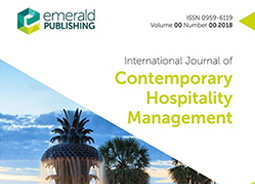
Scale to measure tourist value of destination restaurant service
서선희 (seo@ewha.ac.kr)
식품영양학과

As international tourism has grown, destination food experiences have become more important in tourism. Tourists want to enjoy destination food and they consider food consumption as a large part of their tour. The value of destination food experience can provide a competitive edge for success to the tourism business. This study focus on the value of destination restaurant service that tourists can experience destination foods. Tourists visit restaurants not just to satisfy their hunger but also to fulfill emotional needs because recreation is part of their purpose in dining out. Several aspects of value including an authentic and experiential value as well as functional value to a measurement scale might explain how tourists value destination food in their tourism. In this study, we addressed how value can help elaborate why international tourists visit destination food restaurant by developing a measurement scale specifically for destination restaurant services.
In order to develop scale to measure the value of dining at destination restaurants, we proceeded three stages: 1) item generation; scale development and scale evaluation. The results showed five dimensions of value of destination restaurant services: service quality value, authentic experience value, emotional experience value, social value and utility value. Service quality value addressed issues of restaurant service. Authentic experience value was associated with the issues of authentic food and cultural experience. Emotional experience value was related to emotion and social value reflected issues of social aspects of people. Utility value was concerned with the total satisfaction received from consuming a good or service. This scale revealed new items that help explain the value of various destination restaurant services among international tourists. The scale, comprising 40 items, was reliable and valid for assessing the value of destination restaurant services.
This study explores the perception of destination restaurant value by adding the concept of authentic experience and experiential value as a distinct quality of tourism and help practitioners understand a tourist’s problem-solving processes in food tourism consumption. This study contributes with a new, reliable and valid measurement scale that was specifically developed to address the unique value of destination restaurant services. The developed scale could be used to extend the research model with antecedents of value and consequences of value for destination restaurant services. The developed scale can help elaborate the value of dining at destination restaurants that cater to international tourists. Considering the popularity of food tourism among international tourists, the developed scale should be useful in assessing how tourists value destination restaurant services, thereby helping restaurant managers create effective marketing strategies.
* References
Destination food image and intention to eat destination foods: a view from Korea. Current Issues in Tourism, 20(2), 135-156.
Multi-dimensional scale to measure destination food image: case of Korean food. British Food Journal, 117(12), 2914-2929.
Influence of informational and experiential familiarity on image of local foods. International Journal of Hospitality Management, 34(1), 295-308.
원본 : 연구처 2020 Newsletter for Humanities, Arts & Social Science
